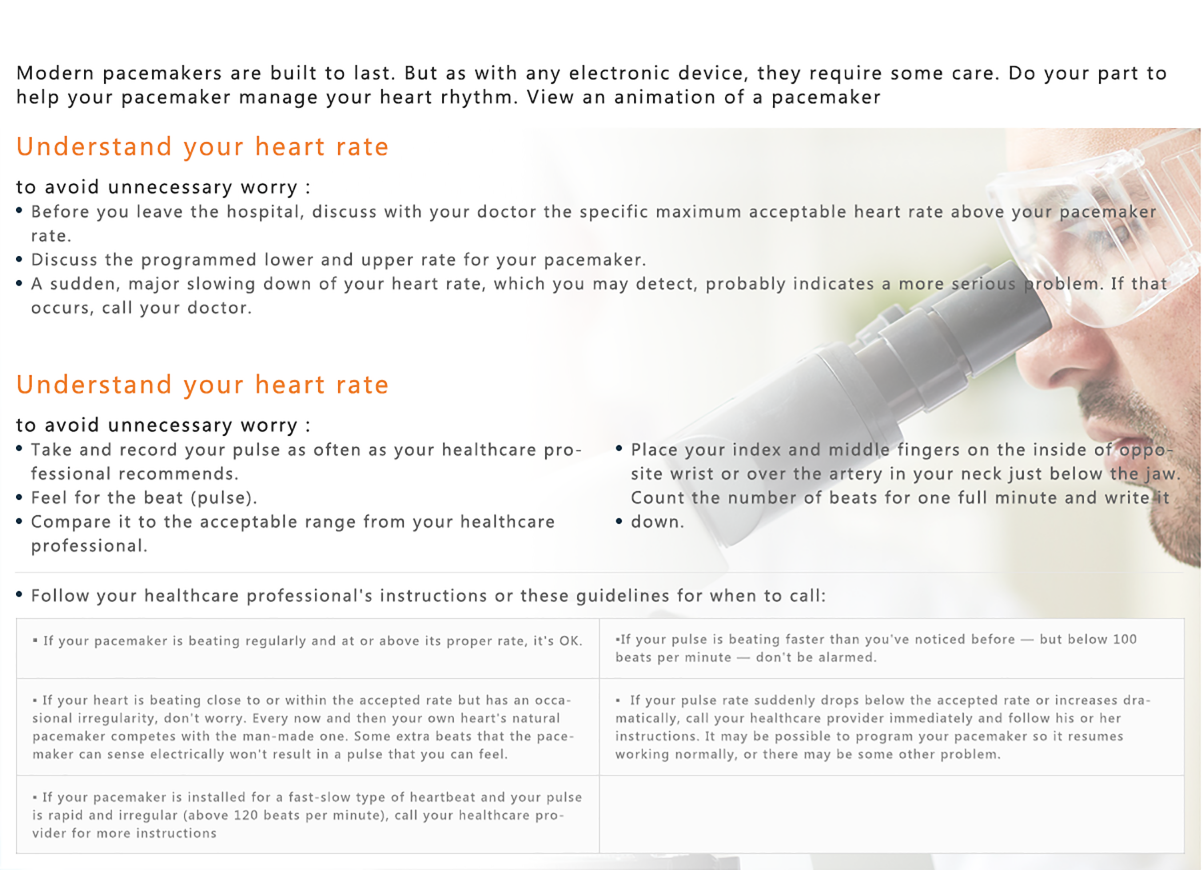起搏器患者康复计划
- 关于起搏器
- 康复计划
与起搏器一起生活
Living with a pacemaker

Understand your heart rate
.exactly as instructed.:
• Medications work with your pacemaker and help your heart pump regularly.
• Keep records of what medications you take and when. Download a printable medication tracker.
Understand your heart rate
• Follow activity restrictions and recommendations from your healthcare professional.
• Allow about eight weeks for your pacemaker to settle firmly in place. During this time, avoid sudden, jerky or violent actions that will cause your arm to pull away from your body.
• Car, train or airplane trips should pose no danger. Be physically active every day. Do whatever you enjoy - take a short walk or just move your arms and legs to help your circulation..
• Ask your healthcare professional about how and when to increase activity.
• You may be able to perform all normal activities for a person of your age.
Carry your pacemaker ID card
Don't leave home without it.
• Download a printable pacemaker ID card.
• In case of accident so emergency personnel can treat you appropriately.
• Security devices in public places may detect the metal in your pacemaker, although they won't damage it. Showing your card may save you some inconvenience.
Keep pacemaker checkup appointments
.exactly as instructed.:
• To work properly, your pacemaker should be checked periodically to find out how the leads are working and how the battery is doing.
• Show your pulse records to your healthcare provider. Make sure medications are working as they should and you're taking them properly.
• Ask questions and discuss your concerns. Make sure you understand your condition and all instructions.
Personal care
▪ Avoid causing pressure over the area of your chest where your pacemaker was put in.
▪ Women may find it more comfortable to wear a small pad over the incision as protection from their bra strap.
▪ Feel free to take baths and showers. Your pacemaker is completely protected against contact with water.
▪ People with pacemakers can continue their usual sexual activity.
▪ Battery maintenance
Battery maintenance
As they wear down, your pacemaker will slow but won't stop right away:
▪ Your doctor uses a special analyzer to detect the first warning that the batteries are running down, before you can detect any changes yourself.
▪ Sudden, major slowing down of your heart rate (which you may detect) probably indicates a more serious problem. Call your doctor immediately.
▪ Eventually your pacemaker will need to be replaced in a minor surgical procedure. Your healthcare provider can explain it to you.
When to call your healthcare provider
Contact your doctor immediately if:
▪ You have difficulty breathing.
▪ You begin to gain weight and your legs and ankles swell.
▪ You faint or have dizzy spells.
▪ Your pulse rate suddenly drops below the accepted rate or increases dramatically
▪ Your pacemaker is installed for a fast-slow type of heartbeat and your pulse is rapid and irregular (above 120 beats per minute).